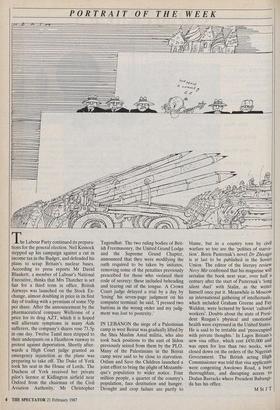PORTRAIT OF THE WEEK
The Labour Party continued its prepara- tions for the general election. Neil Kinnock stepped up his campaign against a cut in income tax in the Budget, and defended his plans to scrap Britain's nuclear bases. According to press reports Mr David Blunkett, a member of Labour's National Executive, thinks that Mrs Thatcher is set fair for a third term in office. British Airways was launched on the ,Stock Ex- change, almost doubling in price in its first day of trading with a premium of some 55p per share. After the announcement by the pharmaceutical company Wellcome of a price for its drug AZT, which it is hoped will allieviate symptoms in many Aids sufferers, the company's shares rose 73.5p in one day. Twelve Tamil men stripped to their underpants on a Heathrow runway to protest against deportation. Shortly after- wards a High Court •judge granted an emergency injunction as the plane was preparing to take off. The Duke of York took his seat in the House of Lords. The Duchess of York received her private pilot's licence at Kidlington airfield near Oxford from the chairman of the Civil Aviation Authority, Mr Christopher Tugendhat. The two ruling bodies of Brit- ish Freemasonry, the United Grand Lodge and the Supreme Grand Chapter, announced that they were modifying the oath required to be taken by initiates, removing some of the penalties previously prescribed for those who violated their code of secrecy: these included beheading and tearing out of the tongue. A Crown Court judge delayed a trial by a day by `losing' his seven-page judgment on his computer terminal: he said, `I pressed two buttons in the wrong order and my judg- ment was lost to posterity.'
IN LEBANON the siege of a Palestinian camp in west Beirut was gradually lifted by the Shia Muslim Amal militia, who also took back positions to the east of Sidon previously seized from them by the PLO. Many of the Palestinians in the Beirut camp were said to be close to starvation. Oxfam and Save the Children launched a joint effort to bring the plight of Mozambi- que's population to wider notice. FOur million people, a quarter of the country's population, face destitution and hunger. Drought and crop failure are partly to blame, but in a country torn by civil warfare so too are the 'politics of starva- tion'. Boris Pasternak's novel Dr Zhivago is at last to be published in the Soviet Union. The editor of the literary review Novy Mir confirmed that his magazine will serialise the book next year, over half a century after the start of Pasternak's long silent duel' with Stalin, as the writer himself once put it. Meanwhile in Moscow an international gathering of intellectuals, which included Graham Greene and Fay Weldon, were lectured by Soviet `cultural workers'. Doubts about the state of Presi- dent Reagan's physical and emotional health were expressed in the United States. He is said to be irritable and `preoccupied with private thoughts.' In Lagos Britain's new visa office, which cost £450,000 and was open for less than two weeks, was closed down on the orders of the Nigerian Government. The British acting High Commissioner was told that visa applicants were congesting Awolowo Road, a busy thoroughfare, and disrupting access to Dodan Barracks where President Babangi- da has his office.
M St J T


















































 Previous page
Previous page